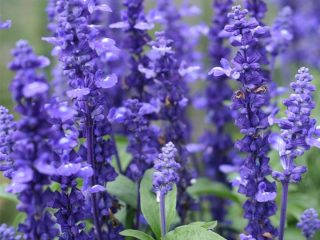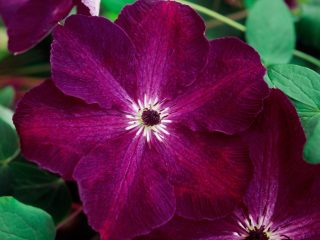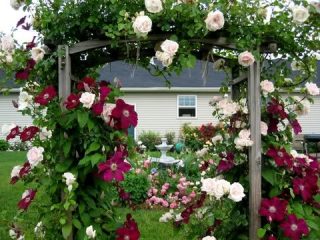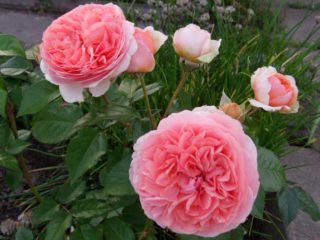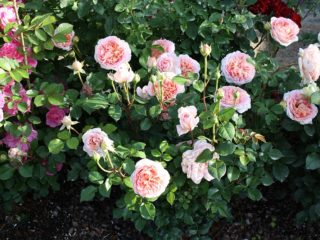Content
- 1 Description and characteristics of small petals
- 2 Types and varieties of small petals
- 2.1 Acrid petals (Erigeron acris)
- 2.2 Composite small petal (Erigeron compositus)
- 2.3 Beautiful small petal (Erigeron speciosus)
- 2.4 Small-petaled Karvinsky (Erigeron karvinskianus)
- 2.5 Daisy-leaved small petal
- 2.6 Erigeron orange (Erigeron aurantiacus)
- 2.7 Small-petaled Rose of July
- 2.8 Pink treasure
- 2.9 Azur Beauty
- 2.10 Erigeron hybrid Blau
- 2.11 Small petals light blue
- 3 Reproduction methods
- 4 Conditions for growing small petals
- 5 Planting and caring for perennial small petals
- 6 Diseases and pests
- 7 Small petals in landscape design
- 8 Conclusion
The perennial small-petal is an unpretentious, ornamental plant of the Astrov family. The genus contains more than 200 varieties of culture that have spread throughout the world.
Description and characteristics of small petals
The height of the bush in most varieties is up to 70 cm. The stems are thin, with varying degrees of branching. The spreading of the bush is average. The leaf plates are lanceolate or oval-shaped, with a bright green hue. The length of each leaf reaches 18-20 cm.
Most varieties have flowers that look like a daisy in the photo. In the perennial small-petal, the buds are often solitary, although there are species in which the baskets are collected in inflorescences. The petals are elongated, united in cups. The color of the buds is varied: white, pink, yellow, lilac. The average size of each flower is 3 cm in diameter.
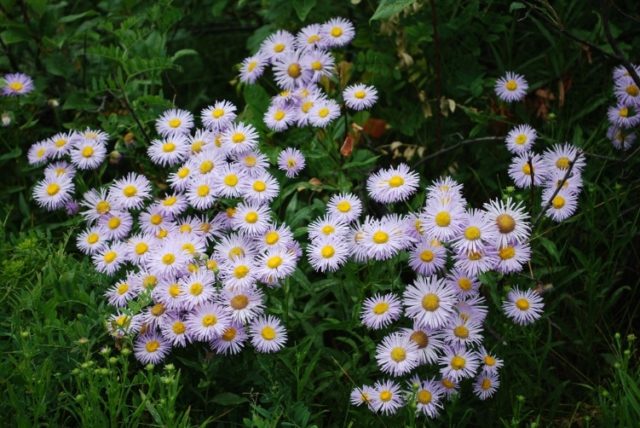
Depending on the variety, the buds appear in early summer and wither in mid-autumn or after the onset of frost.
Types and varieties of small petals
A wide variety of varieties and types of erigeron allows you to choose the best option for your garden. Florists love small-petaled not only for its appearance, but also for its qualities: unpretentiousness, frost resistance.
Acrid petals (Erigeron acris)
Herbaceous plant with a fibrous root system. The height of the bush is 15-60 cm. The stems are straight, green with a reddish tint. The upper shoots branch. The leaf plates are lanceolate, pointed. The buds are collected in baskets - paniculate inflorescences.
Flowers are lavender at the edges of the panicle, yellowish-green in the center. Small petals of caustic bloom occurs in June-August.
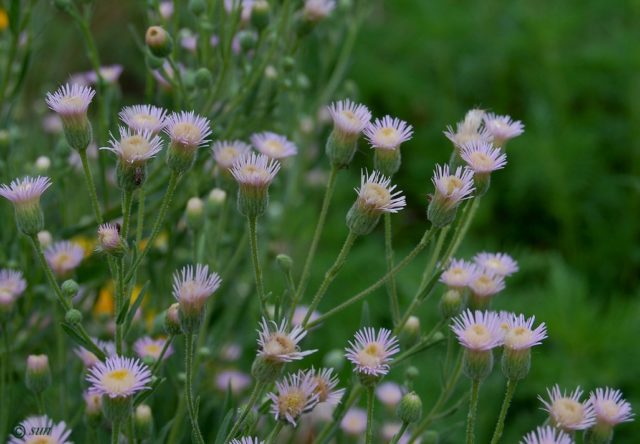
And although the chemical composition of the caustic species has not been studied, it is actively used in folk medicine, perennial erigeron is widespread everywhere, giving preference to meadows and forest glades, forest edges
Composite small petal (Erigeron compositus)
The perennial is up to 15 cm high, the bush spreads up to 10 cm wide. The leaf plates are trifoliate or in the form of 4 lobes, a gray-green hue. The buds are white or pink, there are varieties with pale blue baskets. The diameter of the inflorescence in the small-petaled complex is up to 2 cm.
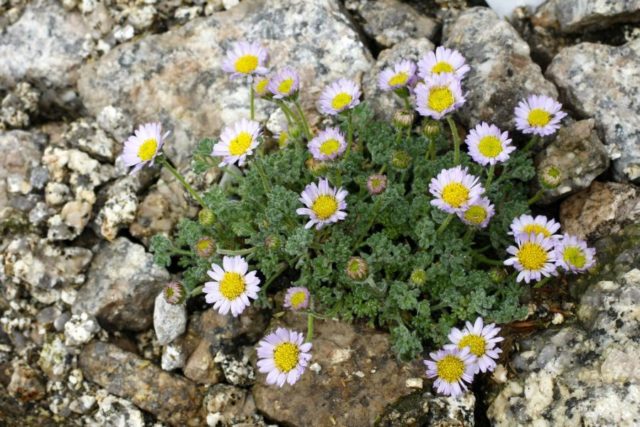
Erigeron perennial baskets bloom in July, wither with the onset of cold weather
Beautiful small petal (Erigeron speciosus)
The perennial is the tallest than other types of erigeron: it reaches a height of 70 cm. Shoots are straight, slightly rough to the touch. The leaf plates are lanceolate, different in size: at the roots, the foliage is larger than at the top of the bush. Flowers are collected in baskets.
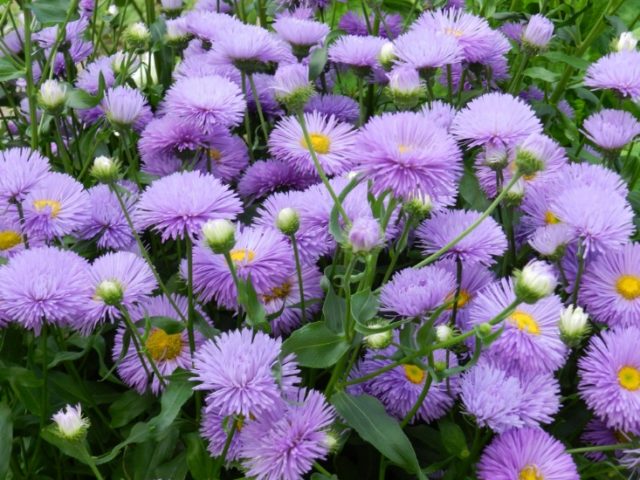
In a small petal, a beautiful color can be heterogeneous: white, in various shades of blue, pink or lilac
Small-petaled Karvinsky (Erigeron karvinskianus)
Perennial is the best option for cultivation in suspended structures, in flower beds. The height of the small-petal Karvinsky Profusion (Profusion) reaches 15 cm. If the flower is allowed to grow freely, it can spread up to half a meter in diameter. Externally, erigeron's baskets look like daisies.
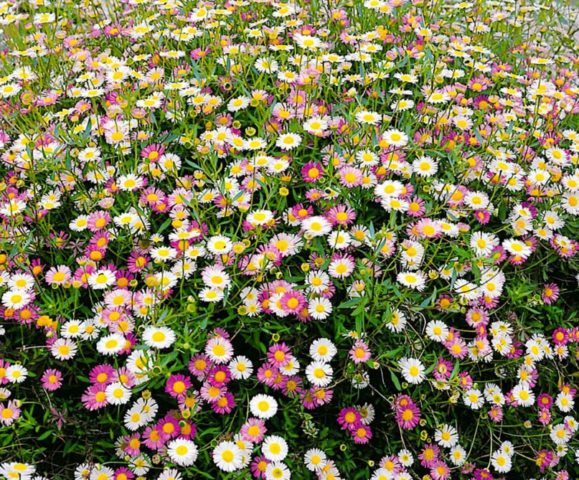
As soon as Karvinsky's bud opens, it is pink in color, but gradually its shade changes to white, and then reddish
Daisy-leaved small petal
A feature of the variety is the color of the baskets. During the flowering period, the buds change color from pink to white, and then to a raspberry hue.
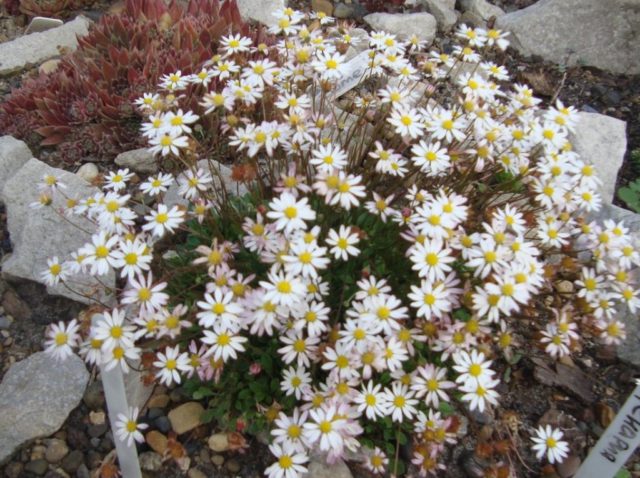
From a distance, a flower can be mistaken for a daisy, which is why the variety got this name.
Erigeron orange (Erigeron aurantiacus)
In nature, the plant can be found in northwest China or in Central Asia. Its height reaches 0.4 m, in diameter the bush grows to 0.5 m.
Stems are straight, they have oval-elongated leaves. The inflorescences in the form of baskets in diameter reach 30 mm, rich orange color.
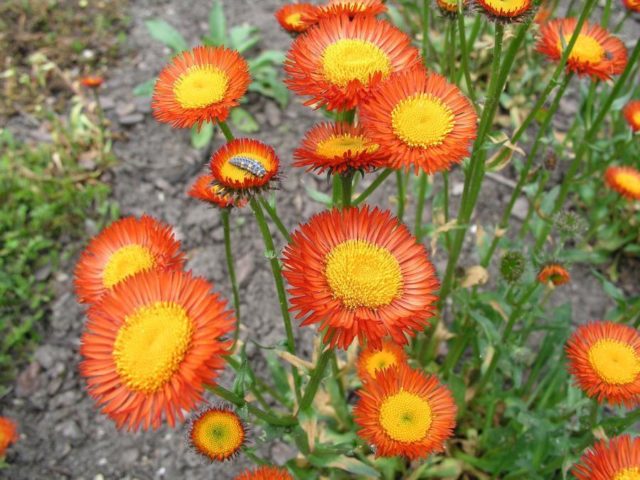
The orange variety has been cultivated by gardeners since 1879.
Small-petaled Rose of July
The perennial is photophilous, tolerates a light shade. Plant height 40-60 cm. Small petal blooms from April to September. The buds are in the form of semi-double baskets, 3-4 cm in diameter. The color of the flowers is lilac-pink, with a yellow center.
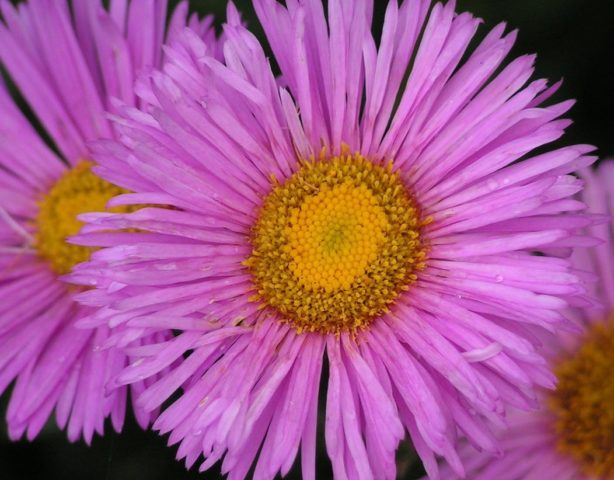
The Rose of July variety is suitable for cutting into bouquets, looks beautiful both in single plantings and in compositions
Pink treasure
Outwardly, the plant is very similar to an aster. The height of the bush is up to 70 cm. The inflorescences are open, deep pink with a yellow center. Small petals prefer sunny places. The flower does not tolerate stagnation of moisture and shade.
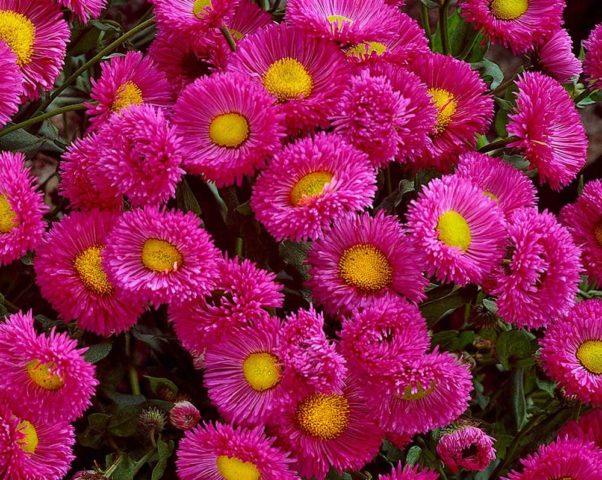
A distinctive feature of the Pink Treasure variety is that it blooms twice a season: from June to August, and then in September.
Azur Beauty
The height of the variety is up to 70 cm, its shoots are densely leafy, straight. The flowers are baskets with a yellow core and small lilac petals with a purple tint. The flowering of the small petals is abundant, lasts from July to August.
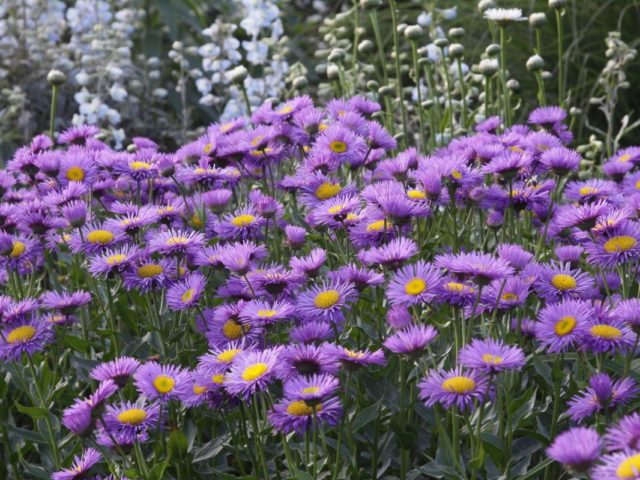
The variety is ideal for cutting, for planting in mixborders, flower beds
Erigeron hybrid Blau
Bushy perennial with straight, branched shoots, up to 50 cm high. In diameter, the bush grows up to 75 cm. The leaf plates are narrow, the baskets are large, single, with a yellow core. The petals of the Erigeron hybrid Blau are lilac.
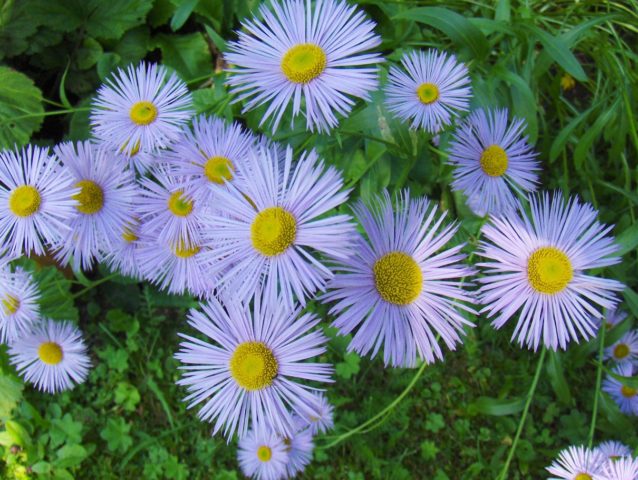
The variety is winter-hardy, prefers loose and moist soil, it is recommended for planting in mixborders, on rocky hills
Small petals light blue
The perennial plant has an external resemblance to asters, but it has pubescent seeds. The height of the bush is up to 70 cm. The buds are 4-5 cm in diameter, the color of the petals corresponds to the name: light blue. The pith of the small petals is yellow.
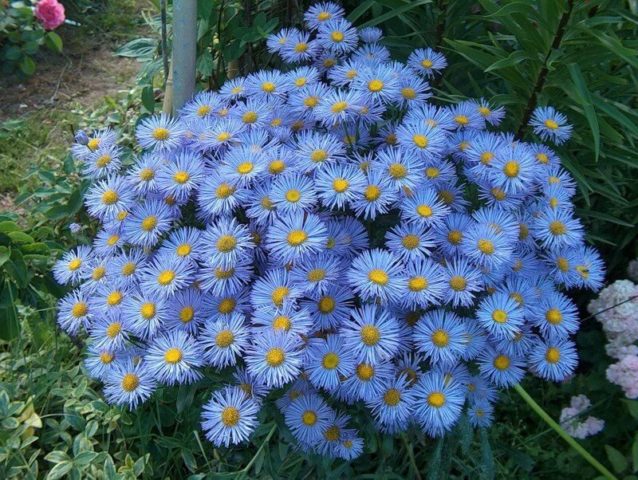
Erigeron perennial light blue bloom lasts from June to October
Reproduction methods
The choice of reproduction of perennial erigeron is at the discretion of the gardener. Most of the centers sell seeds for sale. If there is a plant on the site, the small-petal can be propagated by cuttings or vegetative methods.
Reproduction of small petals by seeds
The optimal time for the procedure is March or April. Seeds do not germinate well, so most gardeners start working with seed in late February or early March to give the seedlings the opportunity to grow stronger.
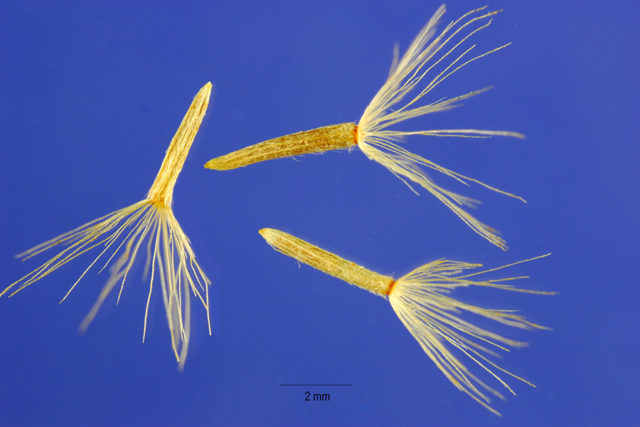
When purchased in specialized stores, seed treatment is not required, manufacturers independently disinfect them
When growing small petals from seeds, young seedlings are transferred to a permanent place in early May. Planting in the open ground of erigeron in April is possible for the southern regions or if gardeners have a greenhouse.
Vegetative way
The method is relevant if adult bushes of perennial erigeron grow on the site for 3-4 years. The method consists in dividing the bush into several parts with further transplantation to a new place.
The optimal time for the procedure is the last month of summer and the first half of September.
Cuttings
From the bush of perennial erigeron, it is necessary to separate young shoots with a part of the rhizome. Place the shoot in garden soil and sprinkle with sand and wood shavings, water. As soon as the small petals take root and begin to grow, they should be relocated to a permanent location.
Conditions for growing small petals
Erigeron perennial prefers alkaline soils. The flower is also able to grow on loams or neutral soils, without stagnant water.
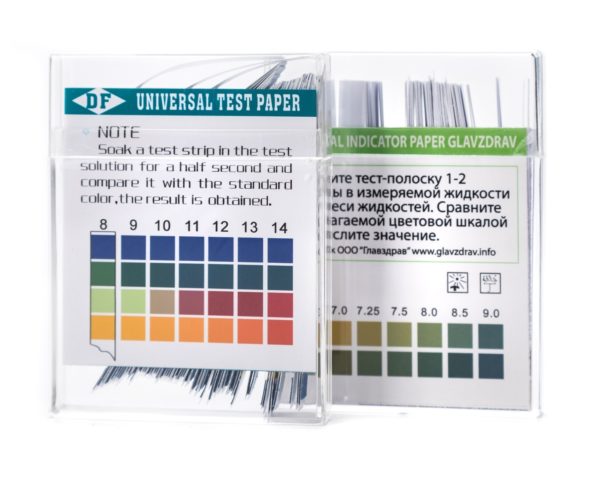
To determine the acidity of the soil, you can use indicator paper
The landing site should be well lit, a slight draft is allowed. With an excess of moisture and a lack of light, perennial erigeron grows poorly, prone to disease.
Planting and caring for perennial small petals
The main planting method is sowing seeds. For those who want to achieve early flowering, it is recommended to use the seedling method. Erigeron perennial, planted with seeds in open ground, grows safely.
When to sow seeds
You can sow the material both in spring and autumn. In February-March, the seeds are used to obtain seedlings. Before winter, they sow material directly into open ground. The choice of planting time depends on personal preference and the variety: if the selected species does not grow well, then it is better to use the seedling method.
Sowing seeds and aftercare
For planting on seedlings, it is necessary to pour soil into the prepared container, moisten it, then distribute the seeds over the soil surface, embedding them to a depth of 0.5 cm, pressing slightly with your finger.
Cover the container with foil, transfer to a warm windowsill. Shoots appear after 30 days. As soon as the seeds hatch, the film should be removed.
Further care consists in watering erigeron, picking it and transplanting it into open ground.
If a decision is made to embed seeds directly into the soil, then the procedure should be carried out in warm, calm weather.
Planting principles:
- dig up the bed, level the soil;
- make furrows, keeping a distance of 25-30 cm between them;
- place the seeds to a depth of 1 cm, cover with earth and a layer of mulch.
When seedlings appear, it is necessary to thin out the plants, leaving a distance of at least 10 cm between them.
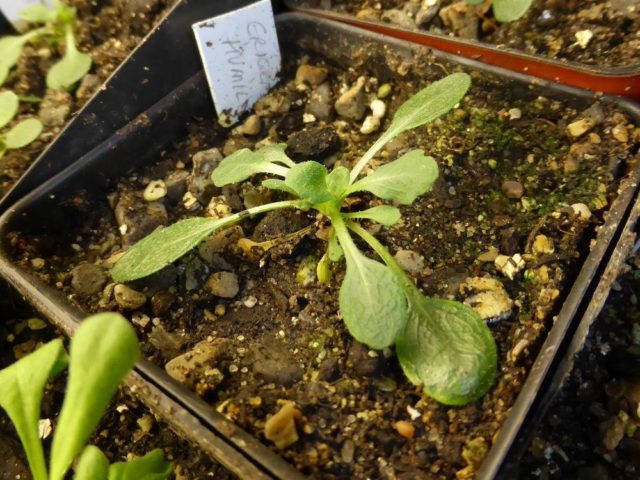
When the plants get stronger, they can be planted.
Further care of the plant is simple: loosening the soil and watering. It should be borne in mind that excess water is destructive for perennial erigeron. To reduce watering, it is enough to mulch the soil around the flower with sawdust.
Due to the abundant flowering in varieties of perennial erigeron with long shoots, branches can bend to the ground. It is recommended to install a support for such bushes.
It is recommended to cut off the faded shoots so that the perennial perennial petals look more neat. It should be borne in mind that when pruning, the bush for the next year will grow more magnificently.
And although erigeron is perennial frost-hardy, the soil around it should be mulched with dry foliage.
Diseases and pests
The flower is susceptible to mold, so it should not be watered too often.To prevent the appearance of the disease, it should be treated with fungicides during flowering. It is allowed to irrigate the bush with a 1% solution of Bordeaux liquid.
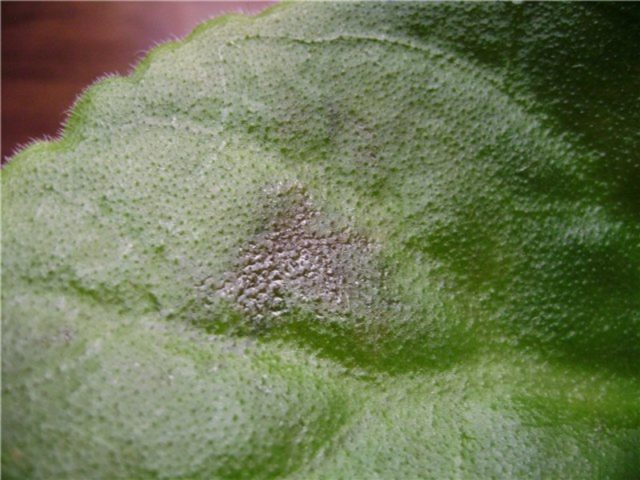
If signs of disease are found on the shoots, the soil should be loosened, all affected parts of perennial erigeron should be removed
Small petals in landscape design
In the open field, gardeners prefer to plant perennial erigeron in company with zinnias, yarrow, ursinia and others. A flower with sage, lobelia looks good.
It can be placed on the site in various places: along the paths, in rock gardens, hanging pots.
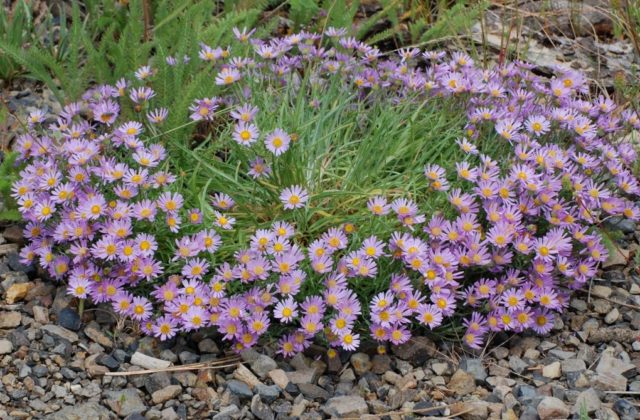
Low-growing varieties are preferably placed in the foreground.
In the form of a background in flower beds, perennial erigeron is placed if the variety is tall. It is recommended to use Heuchera, Daisies and Gaillardia as companions.
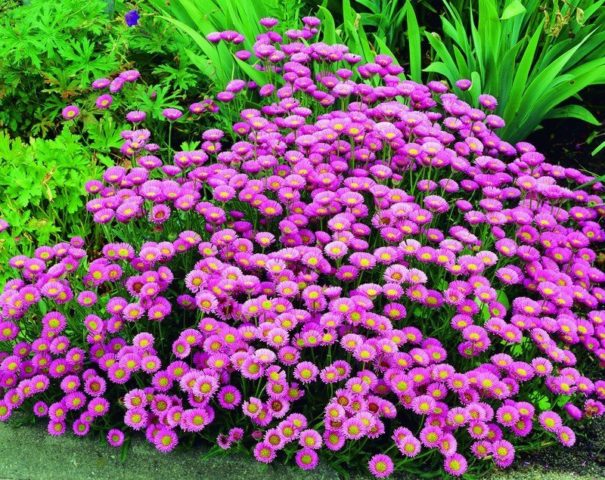
When choosing a site, it should be borne in mind that the plant grows, therefore, in the garden, you can create multi-colored "carpets" from perennial small-petals
Conclusion
Perennial small-petal is one of the most successful flowers for creating landscape design. A long flowering period and a bright, varied color of buds, unpretentious care, the ability to grow in one place for up to 5 years are the main qualities of the culture. The disadvantage of perennial erigeron is the difficulty in planting, the seeds germinate for a long time and poorly.

